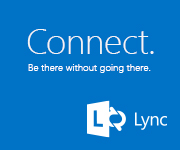One Liners: Finding AD Disabled Accounts Who are Still Lync/Skype for Business Enabled
 Fellow MVP Jeff Guillet wrote an article about the fact that disabling a user’s Active Directory account doesn’t mean they can’t log into Lync/Skype for Business. This is due to the way Lync uses certificates and authentication based on them. I highly recommend you read the article.
Fellow MVP Jeff Guillet wrote an article about the fact that disabling a user’s Active Directory account doesn’t mean they can’t log into Lync/Skype for Business. This is due to the way Lync uses certificates and authentication based on them. I highly recommend you read the article.
I recently was writing some documentation for a customer and wanted to include this important information, including methods for resolving the problem after the fact.
If you’ve not been disabling users in Lync while disabling them in AD, here’s a one liner to find those users:
Get-CsAdUser -ResultSize Unlimited | Where-Object {$_.UserAccountControl -match "AccountDisabled" -and $_.Enabled -eq $true} | Format-Table Name,Enabled,SipAddress -auto
You can shorten it somewhat by not checking if $_.Enabled is $true, but just that it exists. You can get a count of the users using:
Get-CsAdUser -ResultSize Unlimited | Where-Object {$_.UserAccountControl -match "AccountDisabled" -and $_.Enabled} | Measure-Object
and, if you want, can disable them in one line using
Get-CsAdUser -ResultSize Unlimited | Where-Object {$_.UserAccountControl -match "AccountDisabled" -and $_.Enabled} | Disable-CsUser
Update 09-14-2012: Be careful using that last option if you’ve configured test accounts for synthetic testing using the New-CsHealthMonitoringConfiguration cmdlet as I mention in Lync Synthetic Tests: What They are and When They Don’t Work – Part I.
Update 04-12-2014: Replaced aliases with full cmdlet per best practices.
Update 09-19-2014: Added -ResultSize Unlimited










Just what I was looking for! Thanks for the script.
How can you create an automation on this to have it run weekly and email the result to myself like every Monday morning?
Phila
You can pipe that information to Export-CSV which will yield a Comma Separated File you can view with Excel
Get-CsAdUser | Where-Object {$_.UserAccountControl -match “AccountDisabled” -and $_.Enabled -eq $true} | Export-CSV C:\Temp\WeeklyReport.csv
Then afterwards you can leverage the Send-MailMessage from Powershell to automatically send off the email
Send-MailMessage -Attachments C:\Temp\WeeklyReport.csv -To ‘somebodyimportant@contoso.local’ -Body ‘Weekly Report for Old Lync users’ From ‘lyncadmin@contoso.local’ -Subject ‘Weekly Lync Report’ -SmtpServer ‘mylocalsmtpserver.contoso.local’
You would embody the whole thing as a single .PS1 file and then using standard Scheduled Tasks, schedule it as a recurring task.
PowerShell.exe -executionpolicy Bypass -file LyncReport.ps1
Cheers
I’d want to include the -NoTypeInformation switch when calling Export-Csv.
Can I get all username which AD account has been disabled and skype are not disabled, I want to know the list as username..
Hi Pat. I love your Lync/S4B powershell scripts and have found quite a few of them useful. This little gem came in particularly useful. After a little bit of tweaking I managed to make something a little more eye friendly using your script and following some script voodoo from Exchange Server Pro.
$a = “”
$a = $a + “BODY{background-color:peachpuff;}”
$a = $a + “TABLE{border-width: 1px;border-style: solid;border-color: black;border-collapse: collapse;}”
$a = $a + “TH{border-width: 1px;padding: 0px;border-style: solid;border-color: black;background-color:thistle}”
$a = $a + “TD{border-width: 1px;padding: 0px;border-style: solid;border-color: black;background-color:PaleGoldenrod}”
$a = $a + “”
$smtpServer = “smtp.watsammattau.edu”
$smtpFrom = “Lync_Support_Team@watsammattau.edu”
$smtpTo = “Lync_Support_Team@watsammattau.edu”
$messageSubject = “Weekly Disabled AD Users”
$message = New-Object System.Net.Mail.MailMessage $smtpFrom, $smtpTo
$message.Subject = $messageSubject
$message.IsBodyHtml = $true
$message.Body = Get-CsAdUser -ResultSize Unlimited | Where-Object {$_.UserAccountControl -match “AccountDisabled” -and $_.Enabled -eq $true} | Select-Object Name,Enabled,SipAddress | ConvertTo-HTML -head $a
$smtp = New-Object net.mail.smtpclient($smtpServer)
$smtp.Send($message)
Get-CsAdUser -Filter {UserAccountControl -eq “AccountDisabled, NormalAccount” -and Enabled -eq $true} | Set-CsUser -Enabled $false
The one thing it lacks is a mechanism that says if there are no names to list, not run or send the email.
Wouldn’t the output also include active, shared mailboxes with voice enabled?
Thank you very much for this, all 3 of these commands worked flawlessly and did exactly what I needed. We sadly did not have a very good termination policy in place up until mid last year and this really covered us to make sure none of these accounts slipped past. A shocking 183 were still active up until I ran this. Again thanks for powershell commands, they helped a bunch.
To get the names of the disabled accounts:
Get-CsAdUser -ResultSize Unlimited | Where-Object {$_.UserAccountControl -match “AccountDisabled” -and $_.Enabled -eq $true} | Format-Table Name
If I runt the script as is like you mention I will lose certain account that I still need. Is there a way to modify the script to exclude certain accounts?
Get-CsAdUser -ResultSize Unlimited | Where-Object {$_.UserAccountControl -match “AccountDisabled” -and $_.Enabled} | Disable-CsUser
Anything is possible. But you didn’t include info on how to identify the accounts you need to keep. Without that, I can’t help.
Hey, Pat. The switch to just identify the Enterprise Voice users that are disabled in AD would be helpful. Thanks
I just want further clarification on this. I fthe Lync/Skype environment does NOT allow remote users and there are NO MOBILE DEVICES with Skype/Lync. This does not apply correct? Our environment is pretty lockdonw. They are using Managed machines and our LYNC/SKYPE does not allow REMOTE Logins. I just want to test my understanding if it’s correct.
It doesn’t mean that it doesn’t apply – just that the risk is lower.
Thanks for sharing this article, Only one thing I want to know that, Can I get all username which AD account has been disabled and skype are not disabled, I want to know the list as username.. Thanks
Can I get those accounts list in forms of UserName or email which are disabled in AD and Lync/Skype for business disabled? I want to find all users using my console application.
Can anyone let me know how to do this? Thanks in Advance.
@EnergizedTech
Hi folks,
Can I get those accounts list in forms of UserName or email which are disabled in AD and Lync/Skype for business disabled? I want to find all users using my console application.
Can anyone let me know how to do this? Thanks in Advance.